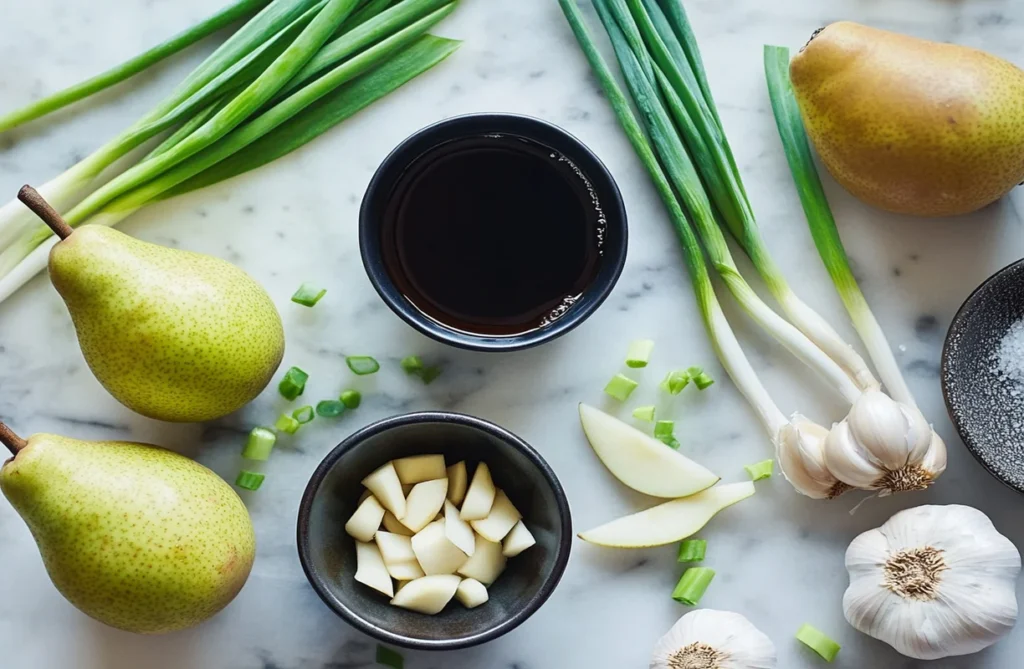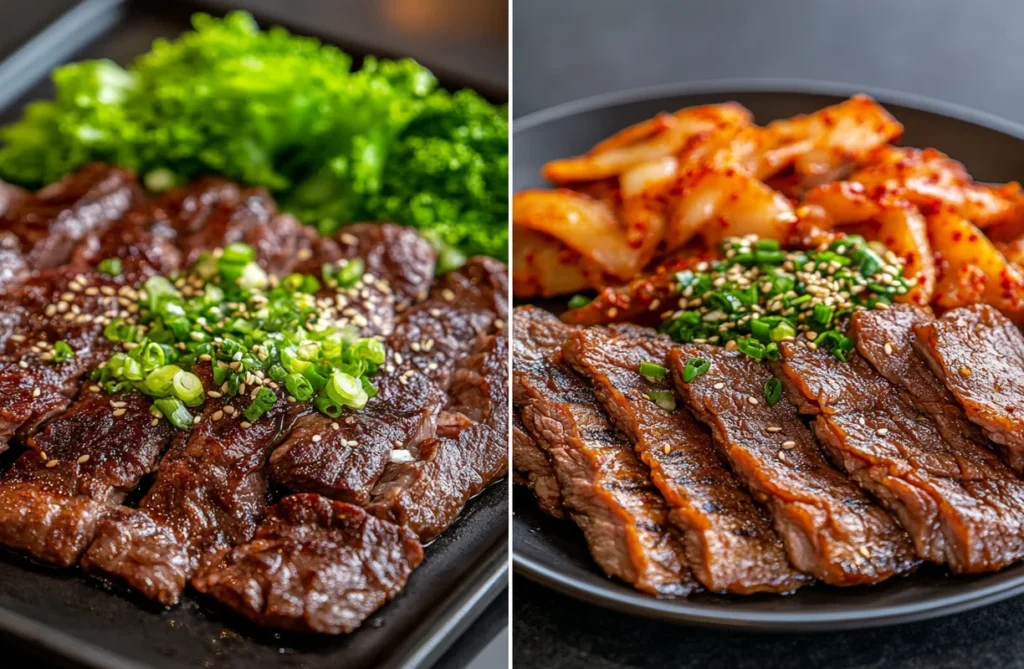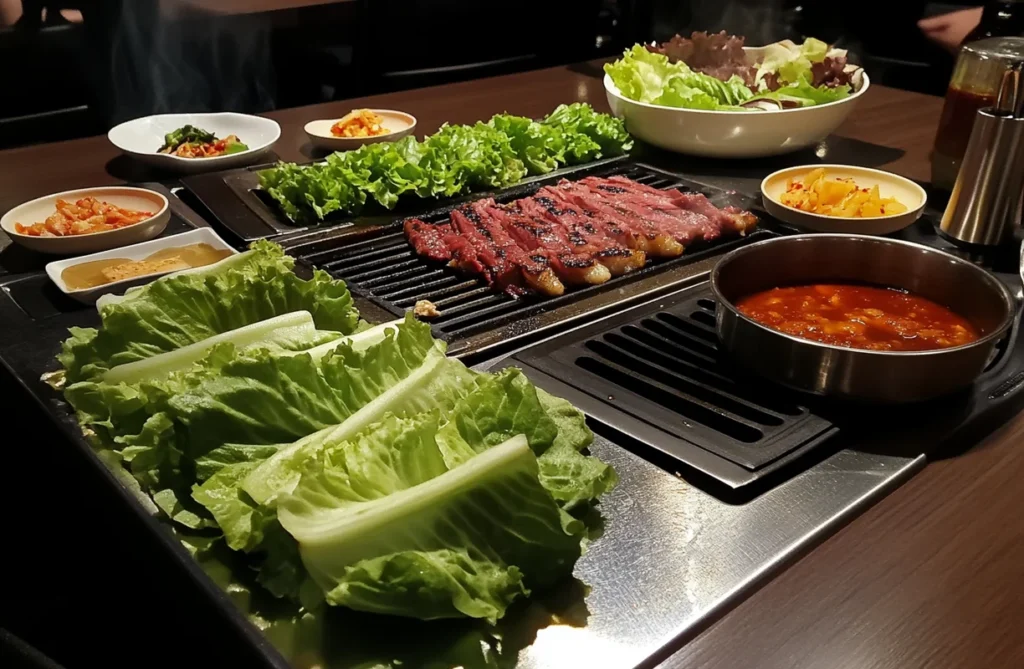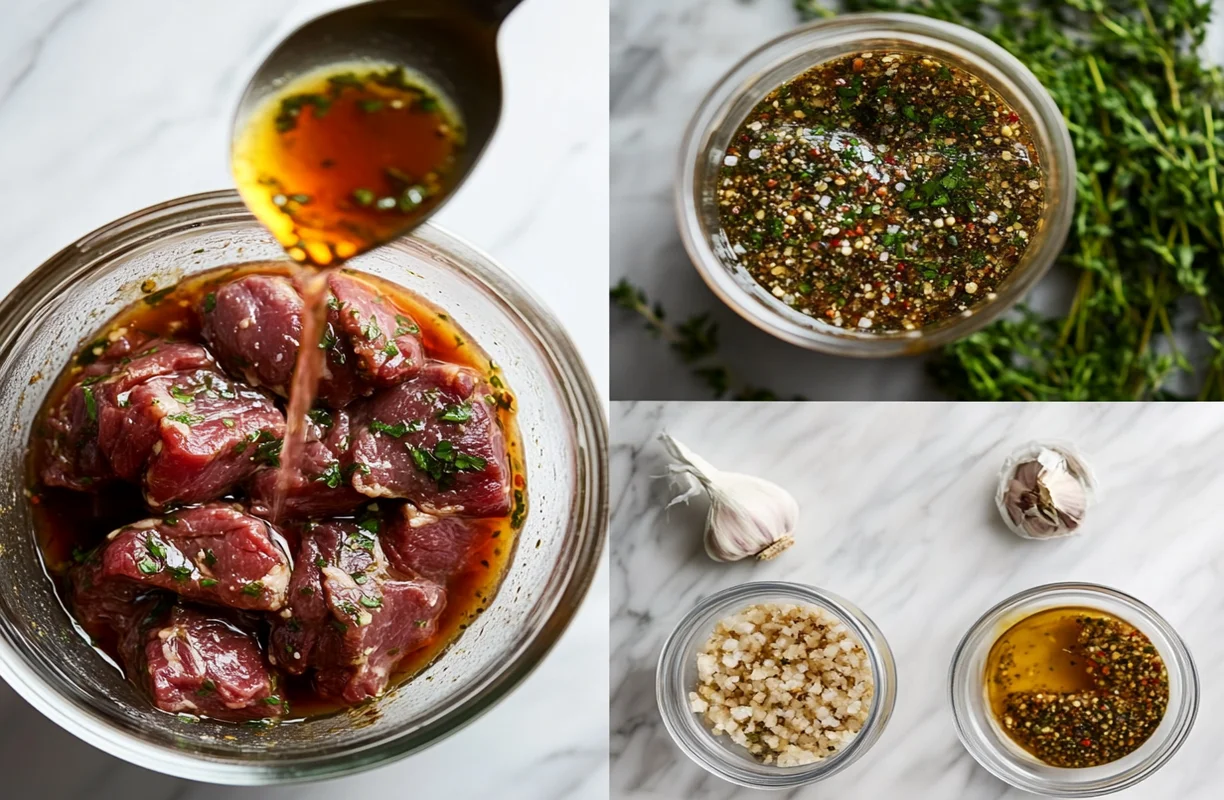Korean BBQ has taken the world by storm, and for good reason. The sizzling sounds, the mouthwatering aromas, and the explosion of flavors make it an unforgettable dining experience. But if you’ve ever found yourself staring at a menu, wondering, “Is kalbi and bulgogi marinade the same?”—you’re not alone. It’s a question that has puzzled foodies and home cooks alike. Let’s dive into the delicious world of Korean BBQ and unravel this mystery together.
What is Kalbi?
Kalbi, also known as galbi, is a Korean dish made with beef short ribs. These ribs are typically cut thinly across the bone, a style called LA galbi, which makes them perfect for grilling. The name kalbi literally means “rib” in Korean, and it’s a staple at Korean BBQ restaurants. But what sets kalbi apart is its marinade—a sweet, savory, and slightly tangy concoction that transforms the meat into a flavor bomb.
Imagine biting into a piece of kalbi: the caramelized edges, the tender meat, and the rich, umami-packed marinade that seeps into every bite. It’s like a symphony of flavors playing on your taste buds.
What is Bulgogi?
Now, let’s talk about bulgogi. If kalbi is the star of the ribs, bulgogi is the king of thinly sliced beef. The name bulgogi translates to “fire meat,” which hints at its traditional preparation over an open flame. Bulgogi is typically made with cuts like sirloin or ribeye, sliced paper-thin to ensure it soaks up the marinade and cooks quickly.
Bulgogi’s marinade is slightly different from kalbi’s, but it’s just as addictive. Think of it as the cousin who’s a little sweeter and a touch more garlicky. When done right, bulgogi is tender, juicy, and packed with flavor. It’s the kind of dish that makes you want to lick the plate clean.
The Role of Marinades in Korean Cuisine
Marinades are the heart and soul of Korean BBQ. They’re not just a seasoning—they’re a transformation. A good marinade can turn a humble piece of meat into a masterpiece. But why are marinades so important in Korean cuisine?
For starters, Korean cooking is all about balance. The perfect marinade strikes a harmony between sweet, salty, savory, and tangy. It’s like a tightrope walker—one wrong move, and the whole thing falls apart. But when it’s done right, it’s pure magic.
Why Marinades Matter in Korean BBQ
Marinades do more than just add flavor. They tenderize the meat, infuse it with moisture, and create that beautiful caramelization when grilled. Without a good marinade, your kalbi or bulgogi would be, well, just meat. And let’s be honest—no one wants just meat when you can have a flavor explosion.
As Chef Roy Choi once said, “Korean food is all about the marinade. It’s the soul of the dish.” And he’s absolutely right. The marinade is what makes Korean BBQ so special, so unique, and so downright delicious.
Key Ingredients in Korean Marinades
So, what goes into these magical marinades? While recipes can vary, there are a few key ingredients that you’ll almost always find:
- Soy Sauce: The backbone of the marinade, providing that deep, savory umami flavor.
- Sugar or honey:adds sweetness to sauces and helps with caramelization, enhancing the flavor and texture of grilled meats. By incorporating these ingredients, you can achieve a perfect balance of sweet and savory, while also creating a delicious glaze that caramelizes beautifully on the grill.
- Garlic: Because what’s Korean food without garlic? It’s like the bassline in a song—you might not always notice it, but it’s essential.
- Sesame Oil: Adds a nutty richness that ties everything together.
- Asian Pear or Kiwi: These fruits contain enzymes that tenderize the meat, making it melt-in-your-mouth tender.

Kalbi Marinade: Ingredients and Flavor Profile
Let’s zoom in on kalbi marinade. Traditional kalbi marinade includes soy sauce, sugar, garlic, sesame oil, and often a touch of rice wine or mirin for acidity. Some recipes also call for grated Asian pear or kiwi, which not only adds sweetness but also helps break down the meat’s fibers.
The result? A marinade that’s rich, savory, and slightly sweet, with a hint of nuttiness from the sesame oil. It’s like a warm hug for your taste buds.
Bulgogi Marinade: Ingredients and Flavor Profile
Bulgogi marinade shares some similarities with kalbi marinade but has its own unique twist. It typically includes soy sauce, sugar, garlic, sesame oil, and green onions. Some recipes also add a splash of sesame seeds or a bit of ginger for extra zing.
The flavor profile of bulgogi marinade is a bit sweeter and more garlicky than kalbi’s. It’s like the life of the party—bold, vibrant, and impossible to ignore.
Comparing Kalbi and Bulgogi Marinades
At this point, you might be wondering, “Are these sauces really that different?” The answer is a resounding yes! Each Korean BBQ sauce has its own unique flavor profile, ingredients, and purpose. From the sweet and tangy notes of chojang to the bold, spicy kick of gochujang, these sauces bring distinct tastes to the table. Exploring these differences not only enhances your BBQ experience but also helps you pair the right sauce with the right dish. So, let’s dive deeper into what makes each sauce special and how they can transform your meals.
Think of it like two siblings. They might look alike and share the same DNA, but they each have their own personality. And that’s what makes them both so special.
Common Problems When Preparing Kalbi and Bulgogi Marinades
Now, let’s talk about the challenges. Making the perfect marinade isn’t always easy. Here are some common problems you might encounter:
- Overpowering Soy Sauce Flavor: Too much soy sauce can make your marinade overly salty and mask the other flavors.
- Meat Not Absorbing the Marinade: If your meat isn’t soaking up the marinade, it might be because you didn’t marinate it long enough or the cuts are too thick.
- Marinade Too Sweet or Too Salty: Finding the right balance can be tricky, especially if you’re new to Korean cooking.
Solutions to Common Marinade Problems
Don’t worry—we’ve got you covered. Here are some tips to help you avoid these pitfalls:
- Balancing Soy Sauce with Other Ingredients: Use low-sodium soy sauce and adjust the amount to suit your taste. If the taste is too salty, balance it by adding a bit more sugar or fruit.
- Proper Marinating Time and Techniques: For best results, marinate your meat for at least 4 hours, or overnight if possible. Ensure the meat is completely immersed in the marinade.
- Adjusting Sweetness and Saltiness: Taste your marinade before adding the meat. If the flavor is overly sweet, balance it by incorporating a touch more soy sauce.
- If the flavor is overly salty, you can balance it by incorporating additional sugar or water.
Perfecting Your Kalbi and Bulgogi Marinades
Tips for Perfecting Your Kalbi and Bulgogi Marinades
So, you’ve got the basics down, but how do you take your marinades from good to great? Here are some pro tips to help you master the art of Korean BBQ marinades:
- Use Fresh Ingredients: This might sound obvious, but fresh garlic, green onions, and high-quality soy sauce can make a world of difference.Consider it similar to constructing a house—you need a strong and stable foundation.
- Experiment with Ratios: Don’t be afraid to tweak the recipe to suit your taste. Love garlic? Add an extra clove. Prefer it sweeter? Throw in a bit more sugar. Cooking is more about creativity and expression than following rigid rules.
- Sample and tweak as you proceed: Be sure to test your marinade before introducing the meat.
- If something feels off, adjust it. Trust your instincts—you’re the chef!
Health Considerations in Kalbi and Bulgogi Marinades
Let’s face it—Korean BBQ isn’t exactly health food. But that doesn’t mean you can’t make healthier choices. Here’s how:
- Reducing Sodium in Korean Marinades: Use low-sodium soy sauce or tamari, and cut back on the salt. You can also add more fruit, like Asian pear, to balance the flavors without relying on salt.
- Making Healthier Marinade Choices: Swap out refined sugar for honey or coconut sugar, and use leaner cuts of meat. You can also add more veggies to your BBQ spread for a balanced meal.

FAQ Section
What is Korean BBQ Marinade Made Of?
Korean BBQ marinade is a flavorful blend of ingredients that typically includes soy sauce, sugar (or honey), garlic, sesame oil, and sometimes fruit like Asian pear or kiwi for sweetness and tenderness. Additional ingredients like green onions, ginger, and sesame seeds can also be added for extra depth and aroma. The exact recipe can vary depending on whether you’re making kalbi (short ribs) or bulgogi (thinly sliced beef), but the core ingredients remain similar. It’s all about balancing sweet, savory, salty, and tangy flavors to create that signature Korean BBQ taste. If you’re looking for a quick and authentic option, check out these top picks for store-bought Korean BBQ marinade to elevate your cooking game.
How Do I Use Store-Bought Korean BBQ Sauce?
Store-bought Korean BBQ sauce is a convenient option for busy cooks. Here’s how to master its use like an expert:
- As a Marinade: Pour the sauce over your meat (beef, pork, chicken, or even tofu) and let it marinate for at least 4 hours, or overnight for maximum flavor.
- As a Glaze: Brush the sauce onto your meat while grilling or pan-frying for a caramelized, sticky finish.
- As a Dipping Sauce: Serve it on the side for dipping cooked meat or veggies.
- In Stir-Fries: Use it as a sauce base for stir-fried dishes by adding it to your pan along with your protein and vegetables.
Pro tip: If the store-bought sauce is too strong or salty, dilute it with a bit of water or mix in some honey or grated pear to balance the flavors.
What is the Sauce They Give You at Korean BBQ?
At Korean BBQ restaurants, you’ll often be served a variety of sauces to complement your meal. The most common ones include:
- Ssamjang: A thick, savory paste made from fermented soybean paste (doenjang), chili paste (gochujang), garlic, sesame oil, and green onions. It’s perfect for wrapping grilled meat in lettuce leaves (ssam).
- Gochujang Sauce: A spicy, slightly sweet sauce made from gochujang (Korean chili paste), vinegar, sugar, and sesame oil. It adds a kick to your meat.
- Sesame Oil with Salt: A simple mix of toasted sesame oil and salt, often used for dipping grilled meat to enhance its richness.
- Vinegar Soy Sauce: A tangy dipping sauce made with soy sauce, vinegar, and sometimes chili flakes or sesame seeds.
Conclusion – Kalbi and Bulgogi Marinades, Similar but Distinct
Final Thoughts on Kalbi and Bulgogi Marinades
So, is kalbi and bulgogi marinade the same? The answer is both yes and no. While they share many of the same core ingredients—soy sauce, sugar, garlic, and sesame oil—the ratios and additional elements create distinct flavor profiles. Kalbi marinade tends to be richer and more savory, perfect for beef short ribs, while bulgogi marinade leans sweeter and more aromatic, ideal for thinly sliced beef. It’s like comparing two siblings: they come from the same family, but each has its own unique personality.
What makes both marinades so special is their ability to transform simple cuts of meat into something extraordinary. Whether you’re grilling kalbi at a backyard BBQ or sizzling bulgogi on a hot plate, the marinade is the star of the show. It’s the secret sauce (literally) that makes Korean BBQ so irresistible.

Encouragement to Experiment with Korean BBQ at Home
If you’ve never tried making Korean BBQ at home, now’s the time to start. Don’t be intimidated—cooking is all about experimentation and having fun. Start with a basic marinade recipe, then tweak it to suit your taste. Love garlic? Add an extra clove. Prefer it sweeter? Throw in a bit more honey or grated pear. The beauty of cooking is that there are no rules, only possibilities.
And remember, even if your first attempt isn’t perfect, that’s okay. As the famous chef Julia Child once said, “The only real stumbling block is fear of failure. In cooking, you’ve got to have a what-the-hell attitude.” So, grab your apron, fire up the grill, and dive into the delicious world of Korean BBQ.
A Final Word
Korean BBQ is more than just food—it’s an experience. It’s about gathering around the table with friends and family, sharing stories, and enjoying the simple pleasure of good food. Whether you’re team kalbi or team bulgogi, one thing’s for sure: you’re in for a treat. So, the next time someone asks, “Is kalbi and bulgogi marinade the same?” you’ll not only know the answer but also have the skills to whip up both like a pro.

